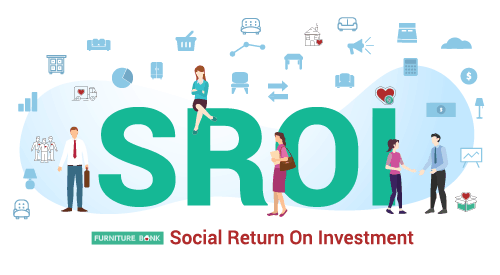Furniture Bank has always received high calibre support from its staff and volunteers but has also been most fortunate to be strongly supported by various other organizations in the Greater Toronto Area.
One of these key partners is the Toronto Enterprise Fund (TEF), a funding partnership of United Way Toronto, the City of Toronto; , the Province of Ontario and the Homelessness Partnerships Initiative, a federal program administered by the City of Toronto. TEF is a partial funder of Furniture Bank’s, social enterprise, and a strong ally in our efforts to bring hope and dignity to Toronto’s marginalized population.
“I don’t even consider ourselves to be supporting Furniture Bank in a traditional sense since the relationship between our organizations is very integrated,” says the Fund’s senior manager Anne Jamieson. “We have been working with Furniture Bank since 2004 and during that time, they have grown to be one of the most successful social enterprises in all of Canada”.
TEF defines a social enterprise as “a business operated by a charity or non-profit organization that sells goods and/or services in the market place, for the dual purpose of generating income and achieving a social, cultural and/or environmental mission.” When an organization is able to achieve both objectives, it can be a powerful experience for all involved and Furniture Bank is a true blueprint for how a social enterprise can grow and thrive in the present day.
Furniture Bank has the distinction of being the single largest social enterprise in all of Canada in terms of employment with over 30 staff, 20 of which are full-time. Furniture Bank started as a repair workshop, focused on being a social enterprise focused on the training ground for at-risk youth, , individuals receiving Ontario Disability Support Program (ODSP) benefits and other marginalized people across Toronto. These individuals would be able to grow their skill set by gaining on the ground experience and eventually look to parlay these skills into job opportunities once their tenure had completed.
As Furniture Bank grew and eventually became the pick-up and delivery service of Furniture Bank, the enterprise started to operate as more of a hybrid model that also offered full-time employment opportunities in addition to the aforementioned skills training. This change was prompted by the growth of Furniture Bank itself and the fact that Furniture Bank could operate in a similar fashion to traditional 9-5 workplaces based on the nature of the work.
In total, more than 100 individuals have been trained under the Furniture Bank umbrella and in 2012, Furniture Bank formalized the employment program, now known as Leg Up, training at-risk-youth and newcomers to Canada in both customer service skills and in warehousing. Furniture Bank regularly reports back to TEF in terms of how the program has positively impacted success metrics such as number of individuals placed into the labour market and improvement in terms of housing and lifestyle.
It has certainly been a journey with many ups and downs but Jamieson points to the program’s big picture goals at the true indicator of its success. “We worked for several years with Furniture Bank on their books to determine how our funding could be used most effectively and efficiently to impact the populations we were looking to service. In the end, it all comes down to skill development and the benefits these new skills can have for the individual.”
By Cam Gordon
Cam is a Toronto-based PR professional and freelance writer. He volunteers his time to write for Furniture Bank.






